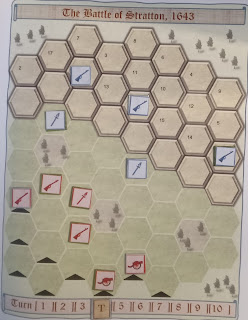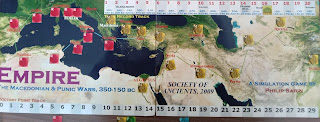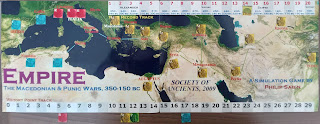 |
Situation in 260 BC
|
This is a particularly important turn since at the end of it victory points will be awarded. Remember the Carthaginians and Persians/Parthians start the game with 12 victory points as a legacy of their already existing empires, while the Romans and Macedonians start on zero. Turns 10 and 20 are the two times extra victory points are awarded.
But first the revolt dice show the province of Persia throws off Macedonian rule and becomes independent.
The Parthians are drawn first, and they roll a 5, one short of the 6 needed to foment rebellion in their homeland.
The Macedonians are next, but they fail to reconquer Persia.
Then, as Carthage, I attack Cisalpina, which gives better odds, thanks to there being no naval crossing, than attacking Sicilia, but I roll a disappointing 2.
The Romans could attack AFRICA, requiring a successful naval crossing followed by a roll with a -1 modifier for attacking a controlled province. If successful, AFRICA would not fall - a special rule has it that instead Carthage's other provinces would revolt and become independent, which would be a big blow for me on turn 10 as it would cost three victory points (one for Numidia, and two for IBERIA).
Alternatively Rome could attack Cisalpina, suffering a -1 modifier for tribal unrest.
Richard ums and ahs about his choice, finally going for Cisalpina and a hoped-for victory point. However, he rolls 1.
 |
| The map at the halfway stage |
Victory PointsThe Persians/Parthians control no provinces, and so remain on 12 victory points.
The Macedonians have 10 provinces, including the double-points scoring AEGYPTUS, scoring 11 points.
The Romans score victory three points for consolidated ITALIA, and one each for Magna Graecia and Sicilia, taking them to five.
The Carthaginians score two victory points each for AFRICA and IBERIA, and one for Numidia, taking them to 17.
 |
| The map after the halfway victory points have been added |
So the scores are: Carthaginians 17, Persians/Parthians 12, Macedonians 11, Romans 5.
The scores at this point in the solo game that I posted were: Carthaginians 17, Macedonians 14, Persians/Parthians 12, Romans 5.
The two games have played out very differently, but the scores are remarkably similar.















.jpg)

































